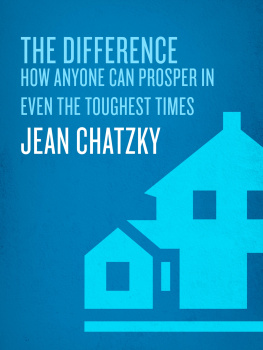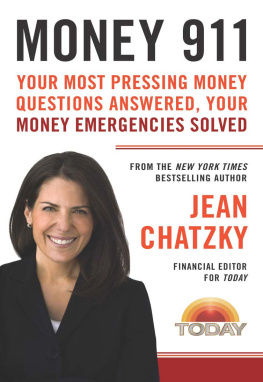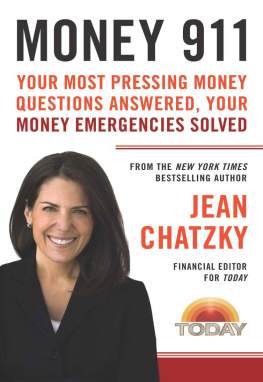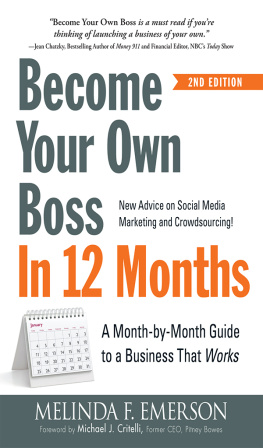Jean Chatzky - Talking Money: Everything You Need to Know about Your Finances and Your Future
Here you can read online Jean Chatzky - Talking Money: Everything You Need to Know about Your Finances and Your Future full text of the book (entire story) in english for free. Download pdf and epub, get meaning, cover and reviews about this ebook. year: 2001, publisher: Grand Central Publishing, genre: Romance novel. Description of the work, (preface) as well as reviews are available. Best literature library LitArk.com created for fans of good reading and offers a wide selection of genres:
Romance novel
Science fiction
Adventure
Detective
Science
History
Home and family
Prose
Art
Politics
Computer
Non-fiction
Religion
Business
Children
Humor
Choose a favorite category and find really read worthwhile books. Enjoy immersion in the world of imagination, feel the emotions of the characters or learn something new for yourself, make an fascinating discovery.

- Book:Talking Money: Everything You Need to Know about Your Finances and Your Future
- Author:
- Publisher:Grand Central Publishing
- Genre:
- Year:2001
- Rating:5 / 5
- Favourites:Add to favourites
- Your mark:
- 100
- 1
- 2
- 3
- 4
- 5
Talking Money: Everything You Need to Know about Your Finances and Your Future: summary, description and annotation
We offer to read an annotation, description, summary or preface (depends on what the author of the book "Talking Money: Everything You Need to Know about Your Finances and Your Future" wrote himself). If you haven't found the necessary information about the book — write in the comments, we will try to find it.
Talking Money: Everything You Need to Know about Your Finances and Your Future — read online for free the complete book (whole text) full work
Below is the text of the book, divided by pages. System saving the place of the last page read, allows you to conveniently read the book "Talking Money: Everything You Need to Know about Your Finances and Your Future" online for free, without having to search again every time where you left off. Put a bookmark, and you can go to the page where you finished reading at any time.
Font size:
Interval:
Bookmark:
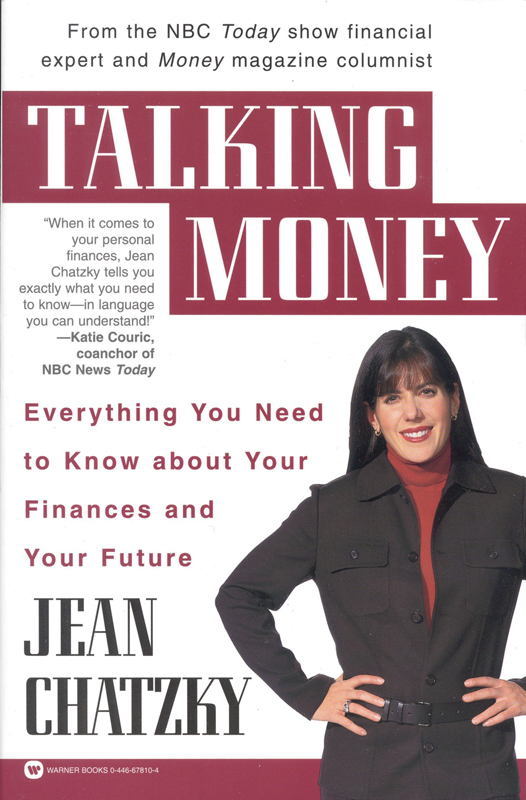
TALKING MONEY. Copyright 2001 by Jean Sherman Chatzky. All rights reserved. No part of this book may be reproduced in any form or by any electronic or mechanical means, including information storage and retrieval systems, without permission in writing from the publisher, except by a reviewer who may quote brief passages in a review.
Warner Business Books
Hachette Book Group
237 Park Avenue
New York, NY 10017
Visit our website at www.HachetteBookGroup.com.
The Warner Business Books name and logo are trademarks of Hachette Book Group, Inc.
ISBN: 978-0-7595-2160-5
First eBook Edition: January 2001
To my parents, Chuck and Elaine Sherman,
whose names may not appear on this volume,
but whose commonsense wisdom is throughout it.
I am very grateful to all of the people who helped me complete this book: First, the three crack researchers who worked diligently on the project: Elyse Mall, who poured her heart into the investment chapter (and many others), Anne Ashby Gilbert, who helped me round up the real people whose lives you read about in every chapter, and Jonathan Lesser, who whipped the Five Questions sections into shape. Next, the folks at Warner Booksthe supportive (and always understanding) Rick Wolff, who edited the manuscript with style, Jamie Raab, who kept a close eye, Mari Okuda, who kept me on my grammatical toes, and Dan Ambrosio, who made sure every i was dotted and every t crossed. My agent, Robert Shepard, who worked tirelessly behind the scenes (and sometimes out in front) in every way imaginable. And finally, my friends and colleagues who read the manuscript when it wasnt in terrific shape and offered enormously helpful input: Ken Adler, Janine Rosenblum, and Denise Martin.
I also owe a huge debt to the experts who lent their knowledge to this project (and to so many of the articles Ive reported through the years): financial planners extraordinaire Ric Edelman, Harold Evensky, Victoria Felton Collins, Joan Gruber, Dee Lee, Patricia Drivanos, Ross Levin, and Gary Schatsky; mortgage whiz Keith Gumbinger of HSH Associates; money therapist Olivia Mellan, author of Overcoming Overspending; financial counselor Karen McCall; my good friend David Landay, author of Be Prepared; Max Bazerman, author of Smart Money Decisions; Gary Belsky and Thomas Gilovich, authors of Why Smart People Make Big Money Mistakes; real estate guru Ray Brown, coauthor of Home Buying for Dummies; Scott Cooley and Eric Jacobson of Morningstar; Juliet Schor, author of The Overspent American; debt experts Marc Eisenson, Nancy Castleman, and Gerri Detweiler of the Good-Advice Press; credit card guru Robert McKinley of Cardweb.com; Inside Flyer magazines Randy Petersen; Dan Rottenberg, author of The Inheritors Handbook; Manhattan estate planning attorney Gideon Rothschild; Jeanne Salvatore of the Insurance Information Institute; Evan Kass of Northwestern Mutual Insurance; Dan Langan of the National Charities Information Bureau; Ron Passaro, founder of the American Society of Home Inspectors; consumer expert Edgar Dworsky; Beth Givens of the Privacy Rights Clearinghouse; matrimonial attorney John Fiske, elder care attorney H. Clyde Farrell; Retire Early author John Wasik; and fee-only insurance consultant Glenn Daily.
I am so fortunate to have three incredible professional families. At Money magazine, I want to thank Denise Martin, Craig Matters, Marion Asnes, Patrick Taylor, and Andrea Bennett for their friendship and overwhelming supportand the incredible Bob Safian, for luring me here in the first place. At USA Weekend, a huge thank you to Kathy McCleary and Marcia Bullard. And at Today, Jeff Zucker, Michael Bass, Betsy Alexander, and Patricia Luchsinger: You guys are the best!
Finally, to my friends and familyparticularly my husband, Peter, and kids, Julia and Jakewho put up with months of me rising at 5:00 A.M. to complete this project (and sometimes falling asleep during dinner as a result), I love you guys.
K ristin, a thirty-seven-year-old recently married freelance writer, is down on her money. Its not like she isnt making any. Actually, shes fairly successful. The problem, she says, is that shes not using her money to its full potential. She ticks off the symptoms: I write down my checks but not my cash machine withdrawals. My husband and I dont have wills. Twice, AT&T has called offering me 7 cents a minute and Ive said, I dont have my bill in front of me, would you call me back in a couple of days?
Marianne, a thirty-six-year-old researcher at a high-tech firm in Silicon Valley, is similarly distressed. Her cash reserve isnt where she wants it to be. Shes overloaded with credit card debt. And, though she deftly unearths facts each day that would take ordinary people months to find, she candidly admits her companys stock purchasing plan has her baffled. I e-mailed my companys human resources department to suggest that a Stock Options for Dummies class might be in order, she quips.
But deep down she feels this is no laughing matter. Im constantly finding out things I should have known about my money if only I was reading the stock pages every day, she says. Even when I do make time to read the paper, Ill learn about something and say: Im going to go out and do that. Maybe Ill even do it on my lunch hour. But most of the time, I dont.
Then theres George, a seventy-year-old former clothing manufacturer in New York City. He has just one money goal: to make sure his six-figure nest egg lasts him through retirement. He turned to a financial adviser to help him develop a portfolio of mutual funds. The result: unending frustration. In less than a year, George found himself the owner of more than two dozen mutual funds. Monitoring them was difficult enough, but worse, he had no idea how to figure out whether they were the right funds to help him accomplish his goals.
Kristin, Marianne, and George are all out of control where their finances are concerned. Its like theyre running a race they have no chance of winningwhich makes perfect sense, because they dont even know what course theyre on. They feel overwhelmed and confused. And not just about one particular problemlike Mariannes optionsbut about their money in general. My husband can tell you to within $1,000 what hes worth, says Kristin. I have no idea what I have. Not that she hasnt tried to remedy the situation. She even made a list of all the money chores she had to accomplish. It sat on a shelf over her desk for two years. She never crossed anything off.
Sound familiar? Have you ever felt your money was running you rather than the other way around? You are not alone. Far from it. Ive given a lot of talks on the subject of money and whenever I ask this question, I see a lot of smiling, nodding, even hand raising throughout the room. Even more importantly: You are not the problem. The problem is all the so-called experts using buzzwords and lingo, and throwing around big numbers and making your money more confusing and frightening than it needs to be. They do this because its profitable. They know that theres a better chance of getting you to pay for something if they can convince you that you desperately need iteven if you dont exactly understand what you need it for.
Take a car dealer. If he can get you to sign a lease that looks cheap on the surface, even though its incredibly costly in the fine print, who profits? He does. If a credit card company can entice you to sign on the dotted line with a three- or six-month bottom-of-the-barrel teaser rate that you only later find out doesnt apply to balance transfers, its going to make a mint. And if a broker or financial planner can get you to buy shares of stocks or mutual funds that really dont suit your needs, she still makes a commission. In fact, she makes it twiceonce when you buy and then again when you figure out what the real deal is and sell.
Font size:
Interval:
Bookmark:
Similar books «Talking Money: Everything You Need to Know about Your Finances and Your Future»
Look at similar books to Talking Money: Everything You Need to Know about Your Finances and Your Future. We have selected literature similar in name and meaning in the hope of providing readers with more options to find new, interesting, not yet read works.
Discussion, reviews of the book Talking Money: Everything You Need to Know about Your Finances and Your Future and just readers' own opinions. Leave your comments, write what you think about the work, its meaning or the main characters. Specify what exactly you liked and what you didn't like, and why you think so.

